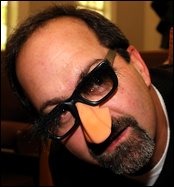I want to take a moment from my busy anonymous-attack-blogging schedule to arbitrate a dispute between Dr. Gary Johnson, pastor of Church of the Redeemer, and Mr. Douglas Wilson, pastor of the Christ Church Cult.
The dispute began two nights ago in the combox at Green Bagginses after the Fearless Leader described the scholarship of Drs. Clark & Waters as “slipshod,” at least as it applied to their criticisms of his work. Of course, challenging the competence of those who disagree with him is the automatic default tactic for Beelzeblog. It’s instinctual for him because as God’s appointed authority on pretty much everything in the universe, he can recognize “slipshod” work from afar. It’s one of his gifts and one of the reasons he doesn’t need formal training. Or ordination. He is THE authority.
Dr. Johnson, however, has no such gifts from on high and God has not appointed him THE authority on all things. After all, the definite article “THE” precludes anyone else from holding the title, especially since it’s capitalized. Consequently, Dr. Johnson had to earn his credentials the hard way by doing under- and post-graduate studies in various schools, where he obtained the titles Doctor of Philosophy (Ph.D.) and Doctor of Theology (D. Theo.).
And for the record, I am not sucking up to Dr. Johnson by heralding his credentials. Some men with letters couldn’t think their way out of a paper bag. But Dr. Johnson established his ability to think critically when he endorsed my blog. Clearly he recognizes the difference between a fully documented anonymous attack blog, such as mine, and self-willed autonomous attack blog, such as Wilson’s. Speaking of whom, for all I know he thinks that the letters STD stand for sexually transmitted disease. This probably explains why he, as a so-called minister of the gospel, filed a frivolous police complaint against people in the community who publicly criticized him and accused them of leaving used condoms in his mailbox. Icky. I am sure that in his mind it makes sense. When people commit the unpardonable sin of calling him to repent in public, they have crossed the invisible line that separates decent, law-abiding citizens from lawless felons who commit grotesque crimes. Indeed, the temptation to discard soiled prophylactics in the property of the US Postal Service overwhelms them. Yes, I’m sure it makes sense to the Great Protector.
Back to my point: Yesterday, Dr. Johnson reminded the Fearless Leader that the stigma of plagiarism stains his credentials and it undermines his standing to comment on anyone else’s scholarship. The Fearless Leader, however, denies Dr. Johnson’s premise. Here’s the thread:
Douglas Wilson said,
Lane, Andy, everyone . . . .
So what is the issue? The issue lies with two categories of critic — first, those who are constitutionally or dispositionally incapable of getting it right. Those who cannot understand the professor’s lectures need to show up for office hours. I am speaking here of those critics that have been shown to be guilty of misunderstandings, misrepresentations and distortions. Lest there be any mistake, there has been no response to my demonstrations of the slipshod work by Guy Waters, Scott Clark and others. And if you doubt that I have or could demonstrate this, why don’t you try to set up that debate I keep talking about between me and any of these gentlemen? I don’t keep saying that I am misunderstood, I keep proving that I am misunderstood. In response (with the exception of men like Lane), all I hear are the crickets. . . .
GLW Johnson said,
DW:
Accusing Waters and Clark of slipshod scholarship is rich indeed coming from someone who is permanently tainted with the scarlet letter P hanging around his neck.
Douglas Wilson said,
Gary, the fact that you actually believe that the scarlet letter P has been placed around my neck is yet another example of what I am talking about. I have no more plagiarized than I have denied any of the five solas. Keep trying.
GLW Johnson said,
DW:
The embarrassing fact, and one that you can not escape from, is that you co-authored a book that was chocked full of plagiarism. You bear your share of responsibility by virtue of having your name on the cover. It would be refreshing if you could stop spinning around long enough to acknowledge your capability. But it seems that ever admitting that you are in the wrong is something that constitutionally you are unable to do.
GLW Johnson said,
TP
DW accused Waters and Clark of faulty scholarship but evades his own responsibility for co-authoring a perfectly dreadful book (that in and of itself doesn’t pass the smell test when it comes to what the question of responsible historical scholarship) that commits the cardinal sin of blatant plagiarism. Just to refresh your memory, but DW went to great lengths to “Clintonize” what constitutes plagiarism. It was pathetic. So pardon me, but when DW starts talking about scholarship, I have a hard time believing he knows what he is talking about — so does a hundred or so faculty members at the Univ. of Idaho.
Douglas Wilson said,
First, on Wesley. After my article on Wesley appeared in Antithesis, I received a letter from Arnold Dallimore commending the article, and basically affirming that what I had written about him wasn’t really the half of it. But I do agree in principle — if Wesley had been collaborating with others, had electronic transfer problems, if his editor had been an electronic nincompoop, if he plausibly claimed that the problem in the citations was entirely an accident, and corrected them in the next edition while owning full responsibility for the mistakes and sloppiness, then I would agree that my condemnation of him was far too harsh.
Gary, what you call “Clintonizing” was Steve Wilkins taking full responsibility for the citation problems, which occurred in his sections, and with me refusing to let him do that. I was the editor, and had not read Time on the Cross at that time, and with a topic that inflammatory I certainly should have. My name was on the cover, and the editorial error that I was part of was egregious, atrocious, embarrassing, and egregious. Is there a magic word I can put in here that keeps it from being Clintonesque? For my part, one thing I will not call it is plagiarism (intellectual theft) because it simply wasn’t. Those who want to read a full account of this can do so in the back of Black & Tan.
Gary, your partisanship is blinding you to issues of basic fairness here. In the past, before all this nastiness erupted, I have contributed to a book that you edited. Suppose — don’t worry! — citation problems are dnow iscovered [sic] in what I wrote and submitted to you, and they somehow got by you. It would be appropriate for you to take responsibility for any number of things editorially, but to demand that you take personal responsibility as though you were a plagiarist (because somebody else made a mistake that you missed) would be a bit thick. And, if someone were out there demanding that you take that kind of responsibility anyway, it would perhaps be a fair conclusion to think that such a one had an axe to grind. Wouldn’t it?
This is really clever rhetoric. Notice that Wilson acknowledges
and diminishes his responsibility as
editor while he completely ignores his responsibilities as
co-author and
publisher. Additionally, he gladly points to Steven
“Machen” Wilkins laying prostrate on his sword —
“It’s his fault!” Furthermore, he muddies the water with the whole “electronic transfer” thingy, leaving it to our imaginations to create a scenario where the electronics magically deleted certain footnote citations at the beginning of each of Wilkins’ paragraphs —
but what about the missing citations in Wilkins’ other books? Moreover, he equivocates between plagiarism, which he redefined as “intellectual theft,” and an “editorial error,” which he defined as “egregious, atrocious, embarrassing, and egregious.”
Hmmmm, I wonder what made the editorial error so “egregious, atrocious, embarrassing, and egregious”? What would the administration of NSA do to a student if he committed an editorial error of this “egregious, atrocious, embarrassing, and egregious” magnitude? Perhaps we’ll never know. Finally, after sufficiently revising the historical facts to help him elude accountability for his role in the plagiarism, Beelzeblog concluded that Dr. Johnson has an ax to grind. It all makes perfect sense.
Obviously we have a standoff between the Ph.D. and the wannabe. One affirms what the other denies. Dr. Johnson cast his lot with the 76(?) academics on the Palouse who affirm that Douglas Wilson and Steven
“Machen” Wilkins committed plagiarism when they co-wrote the monograph
Southern Slavery As It Was; and Mr. Wilson cast his lot with himself, asserting that he “was part of” an “editorial error that . . . was egregious, atrocious, embarrassing, and egregious,” whatever that means; but it was “not . . . plagiarism.”
This is our dispute and in arbitrating it I shall not be arbitrary or capricious. To be sure, I intend to apply my fully documented anonymous attack skills to this quarrel and hopefully we can put this controversy to rest once and for all.
The book
Southern Slavery As It Was was published by Canon Press, which is a publishing ministry of the Christ Church Cult, subject to the authority of the elders and which uses the same standard contract for all its books, at least during the ’90s. We know this because one of Canon Press’ contracts is a matter of public record and was used as evidence by two local citizens in a property-tax dispute that resulted in the Latah County Commissioners
revoking Christ Church’s 501(c)(3) property-tax exemption. (To see the contract, please click
here.)
According to the terms of this contract, Douglas Wilson wears two hats — “Author” and “Publisher.” Moreover, according to the book in question he wears a third hat — “Editor,” which combined with the other two makes for the handy acronym APE. This brings us to the question “What covenantal obligations, if any, does the Canon Press contract place on the APE?” And this is a fair question to ask because, in the end, disputes such as this one are one reason men enter into contracts, or covenants, if you will. Accordingly, on page 2 of the contract, beneath the subsection titled “Delivery of Manuscript and Related Material,” it states:
The author shall bear the responsibility for securing all permissions and consents for use, which shall be delivered to the Publisher with the manuscript.
This clause places the responsibility for securing permissions on the Author, while it obligates the Publisher to receive such from the Author. In other words, the APE was responsible to secure, deliver, and receive all permissions.
Further down on page 2, beneath the subsection titled “Editorial Control,” the contract states:
The Publisher shall exercise sufficient editorial control of the Work to assure that the content of the Work is consistent with the doctrinal standards of Canon Press. . . . The Publisher and the Author shall check the proofs meticulously. . . .
This is the only section of the contract that identifies all three hats of the APE — Author, Publisher, and editor, or “editorial control” — and a fair reading of it leaves no wiggle-room for the APE to shrug his responsibility. He had the double responsibility of exercising editorial control
and “meticulously” proofreading the manuscript.
Finally, on page 3 of the contract in the subsection titled “Warranties and Indemnities” (which is directly beneath the section “Moral Fitness of Author”), it states:
The Author warrants and represents that he is the sole author of the Work and owns all the rights granted to the Publisher under this agreement; that he has the full power to execute the agreement; that the Work has not been published in any form; that the Work will not infringe any copyright or other proprietary right . . . that he has obtained all permissions necessary for publication of the Work . . . .
This clause closes the deal. There is no safety net or escape hatch for the APE. He entered into a three-way covenant between himself as the Author and himself as the Publisher and himself as the Editor, and as the three-headed APE he bears the brunt of the responsibility. He is the principal party charged with the editorial control of the book as well as proofreading the manuscript, and he vouched for the book’s contents through and through. The APE painted himself into a corner that not even he can spin out of and in the end he made covenantal promises that he could not deliver.
Therefore, as the self-appointed fully documented anonymous attack arbitrator of this dispute, I affirm the opinion of Dr. Johnson and hold the APE accountable and culpable for the egregious, atrocious, embarrassing, and egregious plagiarism in
Southern Slavery As It Was. Furthermore, I find the APE in breach of contract, i.e. he is a covenant breaker, and therefore all the convenantal sanctions due to covenant breakers shall fall upon his head.
Thank you.












































